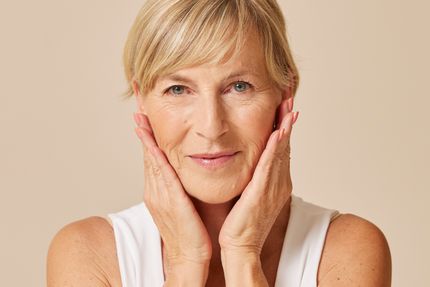

Sabine (age 62): “After years of suffering from PMS, I can’t believe how much better I feel.”
Sabine works as an ambulatory counsellor for people with intellectual disabilities. Visiting clients and travelling between homes is a big part of her job. “My clients rely on me, so being ill was never an option for me, not even when suffering from awful menstrual pain.” PMS was something Sabine has lived with her entire adult life. When perimenopause arrived, her period pain, cramps and mood swings got worse.
That is, until she stopped menstruating. "After my last period, it felt like a switch had flipped. The symptoms I’d had every month for years disappeared overnight."
"At 40, menopause was not on my radar"
Sabine had her last period when she was 46. When her PMS symptoms got worse, she had just turned 40. Menopause was the last thing on her mind. “I’d always suffered from severe menstrual pain, cramps, sore breasts and mood swings before my period. But in my early forties, these symptoms gradually got worse.”

I could literally feel my mood drop in the days leading up to my period.

The discomfort she had learned to live with worsened in the years that followed. “I wasn’t able to control my emotions, even though I knew what caused them. It felt like a dark cloud was hanging over me. I was taking two or three painkillers at once just to cope with my period pains and cramps. My breasts were so sore that I couldn’t sleep on my stomach.”
Every woman’s journey through menopause is different
The age at which perimenopause begins varies from person to person – for some women it’s in their late forties, for others earlier. “When I told my gynaecologist my PMS was getting worse, he pointed out that it could be related to menopause.”
None of Sabine’s friends were menopausal, so she went to her mother for advice. “My doctor suggested I ask my mother about her experience. How old was she when she went through menopause? What symptoms did she have? To my surprise, I discovered that my mother was quite young when her periods stopped and we had similar symptoms, too. She had also struggled with gloominess and depression.”
A healthy lifestyle
What helped? “A hot water bottle and painkillers helped with the pain. I made sure my diet was nutritious, and I went for walks and exercised. My gynaecologist advised me to stick to my healthy habits, like exercising and eating a varied and fresh diet. Regular physical activity helped me regain control over my mood swings.”
“Then my periods stopped. What a relief!”
Sabine had her last period when she was 46. “I can’t tell you how relieved I was. After my last period, all the symptoms that had tormented me for years vanished just like that.”

It felt like a switch had flipped: my mood evened out and the pain disappeared. The difference was huge.

Sabine had read a lot about menopause, so she was prepared for symptoms like hot flashes and sleep problems. “But nothing happened. I couldn’t believe my luck!”
“Speak up about menopause”
What suggestions does she have that could help other women? “The one piece of advice I would give is to talk to your mother about her experience. Your menopause experience might be similar to your mum's. What I've also learned is that every woman’s journey is unique. So don't automatically assume the worst! If you’re like me, you may find that menopause can bring positive changes to your life.”
Are your symptoms hindering your functioning?
It doesn’t have to be this way. A healthy diet, exercise and supplements can make going through menopause a lot smoother. Find out what you can do.

Personal experiences











